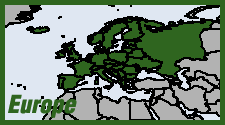 Italian police say Albania, the impoverished Balkan country just across the Adriatic Sea, is the source for vast quantities of cannabis entering G8 and EU member Italy. In the latest major haul in July, Italian Finance Police intercepted a full metric ton of cannabis from a speedboat along the coast of southern Puglia region. Four crewmen were arrested—two Italian and two Albanian. This came one month after the Finance Police released the results of months of air reconnaissance of Albania's hinterland, undertaken in a joint operation with Albanian police—identifying 500 cannabis plantations, accounting for a combined production of 1,000 metric tons with an estimated retail value of 4.5 billion euros. Over the past 20 years since the fall of its rigidly closed Communist dictatorship, Albania has won the title of "Europe's Afghanistan" for its prodigious cannabis production.
Italian police say Albania, the impoverished Balkan country just across the Adriatic Sea, is the source for vast quantities of cannabis entering G8 and EU member Italy. In the latest major haul in July, Italian Finance Police intercepted a full metric ton of cannabis from a speedboat along the coast of southern Puglia region. Four crewmen were arrested—two Italian and two Albanian. This came one month after the Finance Police released the results of months of air reconnaissance of Albania's hinterland, undertaken in a joint operation with Albanian police—identifying 500 cannabis plantations, accounting for a combined production of 1,000 metric tons with an estimated retail value of 4.5 billion euros. Over the past 20 years since the fall of its rigidly closed Communist dictatorship, Albania has won the title of "Europe's Afghanistan" for its prodigious cannabis production.
In the area of Lazarat, on the southern plains near the Greek border, cannabis has emerged as a mainstay of the economy—despite a series of militarized police raids. When a SWAT team descended on the village and started cutting down cannabis plants in August, a convoy of 15 SUVs mounted with heavy machine guns quickly arrived, opened fire, and drove off the cops. "We were drawing indiscriminate fire from 20 positions, including heavy machine guns and anti-tank missiles," a local commissioner told a Global Post reporter. "I saw a 70-year-old grandmother shooting at us with a heavy machine gun. I thought I was going to die."
The European Monitoring Center for Drugs and Drug Addiction (EMCDDA) says that most cannabis enters Europe in the form of hashish from Morocco, Afghanistan (the real one) and Lebanon, while Albania is now the source for the big majority of marijuana in herbaceous form entering the European Union. Italy and Greece are the main entry points. (Oberservatorio Balcani e Caucaso, Oct. 8; Global Post, Aug. 16)
A turning point for Albania's emergence as a European narco state was the 1999 Kosova crisis. Back then, ethnic Albanians in the landlocked and mountainous region of southern Serbia along the Albanian border started arming themselves to protect against "ethnic cleansing" by Serb paramilitary forces. The Kosova Liberation Army (KLA) was quickly assembled, with hashish and heroin rackets funding the warchest. Albanian bretheren across the border in Albanian proper, with Mediterranean sea access, were happy to cooperate. Simultaneously, NATO intervened against Serbia (then still officially a part of rump Yugoslavia). The KLA liberated Kosova, which in 2008 formally declared independence. Alas, NATO troops are still there, while a narco-economy has exploded throughout the Balkans. Dope-for-guns pipelines born of the post-Yugoslav wars have metamorphosed into an entrenched industry, filling the vacuum left by the collapse of the communist system in what has become once again Europe's forgotten backwater.
Cross-post to High Times







Recent comments
4 weeks 1 day ago
4 weeks 1 day ago
7 weeks 2 days ago
8 weeks 1 day ago
12 weeks 2 days ago
16 weeks 11 hours ago
20 weeks 16 hours ago
20 weeks 5 days ago
30 weeks 5 days ago
34 weeks 6 days ago